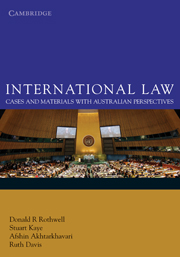Book contents
- Frontmatter
- Contents
- Preface
- About the authors
- Acknowledgements
- Table of cases
- Table of statutes
- Table of treaties and other international instruments
- Abbreviations
- 1 The nature of international law
- 2 Sources of international law
- 3 Law of treaties
- 4 International and municipal law
- 5 International legal personality
- 6 Sovereignty over territory
- 7 Jurisdiction
- 8 State responsibility
- 9 Human rights
- 10 Law of the sea
- 11 International environmental law
- 12 Enforcement of international law
- 13 The peaceful settlement of international disputes
- Index
- References
12 - Enforcement of international law
- Frontmatter
- Contents
- Preface
- About the authors
- Acknowledgements
- Table of cases
- Table of statutes
- Table of treaties and other international instruments
- Abbreviations
- 1 The nature of international law
- 2 Sources of international law
- 3 Law of treaties
- 4 International and municipal law
- 5 International legal personality
- 6 Sovereignty over territory
- 7 Jurisdiction
- 8 State responsibility
- 9 Human rights
- 10 Law of the sea
- 11 International environmental law
- 12 Enforcement of international law
- 13 The peaceful settlement of international disputes
- Index
- References
Summary
Introduction
One of the challenges of the international legal system is that of enforcement. While the municipal legal system has developed mechanisms for law enforcement, ranging from the police forces, the courts and prison systems, there is no equivalent in international law. That international law does not possess the same enforcement mechanisms as that which exists in municipal law is highlighted as a major point of distinction between the two legal systems. It is often said that in the absence of an ‘international policeman’ it is not possible to effectively enforce international law.
While it is clearly the case that the international legal system continues to face challenges with enforcement, the mechanisms which have been developed since the creation of the UN in 1945 have transformed the international legal system from that which predated the outbreak of World War II. Principal among these has been the establishment of the International Court of Justice (ICJ) as the judicial organ of the UN – it has the capacity to resolve international legal disputes and deliver judgments which are binding upon those parties to the case, and which may ultimately be subject to Security Council recommendations if a party ‘fails to perform the obligations incumbent upon it’. In addition, the Security Council also has significant powers under Chapter VII of the UN Charter to seek to ‘maintain and restore international peace and security’ and as part of that mandate the Council regularly adopts resolutions which are binding upon member States of the organisation and enforceable by way of various mechanisms, including economic sanctions.
- Type
- Chapter
- Information
- International LawCases and Materials with Australian Perspectives, pp. 604 - 658Publisher: Cambridge University PressPrint publication year: 2010

